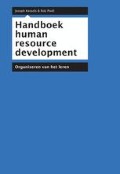Abstract
In deze bijdrage willen we een overzicht geven van het leren in spelsimulaties. Eerst beschrijven we wat spelsimulaties zijn en wat ze kunnen. Daarna gaan we in op leren, waarbij we stilstaan bij een aantal theoretische achtergronden om het leren in spelsimulaties te begrijpen en te verklaren. We geven de vier meest voorkomende voorbeelden van toepassingen van spelsimulaties en we beschrijven de toepassing van spelsimulaties bij grootschalige veranderprocessen. We sluiten af met enkele empirische gegevens over de effectiviteit van de principes van spelsimulaties.
Access this chapter
Tax calculation will be finalised at checkout
Purchases are for personal use only
Preview
Unable to display preview. Download preview PDF.
Literatuur
Argyris, C. (2004). Double-loop learning and organizational change: facilitating transformational change. In: J. Boonstra (ed.),Dynamics of organizational change and learning, pp. 389–402. Chichester: Wiley.
Caluwé, L. de (1997).Veranderen moet je leren; een evaluatiestudie naar de opzet en effecten van een grootscheepse cultuurinterventie met behulp van spelsimulatie. Den Haag: Elsevier.
Caluwé, L. de, & Vermaak, H. (2006).Leren veranderen. Een handboek voor de veranderkundige. Deventer: Kluwer.
Caluwé, L. de, Geurts, J., Buis, D., & Stoppelenburg, A. (1996).Gaming: Organisatieverandering met spelsimulatie. Den Haag: Elsevier.
Caluwé, L. de, Hofstede, G.J., & Peters, V. (Eds.) (2008).Why do games work? In search of the active substance. Deventer: Kluwer.
Duke, R.D. (1974).Gaming, the future's language. New York: Sage.
Geurts, J., & Vennix, J. (1989).Verkenningen in beleidsanalyse: theorie en praktijk van modelbouw en simulatie. Zeist: Kerkebosch.
Geurts, J., Caluwé, L. de, & Kleinlugtenberg, W.J. (2009). Spelsimulaties en onderzoek in de beleids- en organisatiewetenschappen. In: I. Bleijenbergh, H. Korzilius & J. Vennix (red.),Voer voor methodologen. Den Haag: Lemma.
Hersey, P., & Blanchard, K.H. (1988).Management of organizational behaviour. Englewood Cliffs: Prentice Hall.
Kolb, D., Rubin, I.M., & Osland, J.S. (1991).Organization behaviour, an experimental approach. Englewood Cliffs: Prentice Hall.
Kuit, M. (2002).Strategic behavior and regulatory styles in the Netherlands energy industry. Delft: Eburon.
Laere, J. van (2003).Coordinating distributed work: Exploring situated coordination with gaming/ simulation. Delft: Delft University Press.
Lane, D. (1995). On a resurgence of management simulations and games.Journal of the Operational Research Society,46, 604–625.
Mastik, H. (2002).Responsief simuleren: De speelruimte voor leren en sturen in meerduidige context. Delft: Eburon.
Meadows D.L. (1989). Gaming to implement systems dynamics model. In: P.M. Millingen & E.O.K. Zahn (Eds.),Computer-based management of complex systems, pp. 635–640. Berlin: Springer Verlag.
Meer, F.B. van der. (1983).Organisatie als spel: Sociale simulatie als methode in onderzoek naar organiseren. Enschede: Alfa.
Roelofs, E. (2000).Structuring policy issues: testing a mapping technique with gaming/simulation. Tilburg: Gianotten.
Vennix, J.A.M. (1990).Mental models and computer models. Proefschrift, Katholieke Universiteit Nijmegen.
Weick, K.E. (1969).The social psychology of organizing. Reading (Mass.): Addison-Wesley.
Weick, K.E. (1976). Educational organizations as loosely coupled systems.Administrative Science Quarterly,21, 1–19.
Weick, K.E. (1995).Sensemaking in organizations. Thousands Oaks: Sage.
Wierdsma, A., & Swieringa, J. (2002).Lerend organiseren, als meer van hetzelfde niet meer werkt. Groningen: Stenferd Kroese.
Editor information
Rights and permissions
Copyright information
© 2011 Bohn Stafleu van Loghum, onderdeel van Springer Media
About this chapter
Cite this chapter
de Caluwé, L., Stoppelenburg, A. (2011). Leren in spelsimulaties. In: Kessels, J., Poell, R. (eds) Handboek human resource development. Bohn Stafleu van Loghum, Houten. https://doi.org/10.1007/978-90-313-8565-2_28
Download citation
DOI: https://doi.org/10.1007/978-90-313-8565-2_28
Publisher Name: Bohn Stafleu van Loghum, Houten
Print ISBN: 978-90-313-8564-5
Online ISBN: 978-90-313-8565-2
eBook Packages: Dutch language eBook collection

